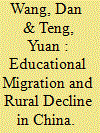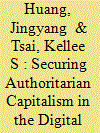|
|
|
Sort Order |
|
|
|
Items / Page
|
|
|
|
|
|
|
| Srl | Item |
| 1 |
ID:
186062


|
|
|
|
|
| Summary/Abstract |
In 2016, China instituted an “Admission of Guilt and Acceptance of Punishment” (plea leniency) system to formalize the legal system’s approach to guilty pleas in criminal proceedings. To legitimize this new justice scheme, it decreed that every accused must be provided with access to legal representation to safeguard the voluntariness and accuracy of the plea. This article examines this mandatory defense counsel assistance and questions the extent to which Chinese lawyers comply with the legislative goal. Based on interviews with 34 lawyers who have served as defense attorneys in Shanghai, it is found that lawyers in plea leniency cases are essentially confined to three peripheral roles—“explainer,” “persuader,” and “observer.” Instead of conducting earnest work in plea negotiations and legal counseling, Chinese lawyers often “collegially” cooperate with criminal justice agencies (gongjianfa 公检法) to urge the accused to admit they are guilty. The findings indicate that the state’s paramount concern for efficiency inherently marginalizes counsel’s bargaining position. Pragmatic considerations also influence the defense counsel’s conduct: a desire to maintain a beneficial relationship with legal authorities and unwillingness to challenge the generally accusatory, draconian, and conviction-centered nature of Chinese criminal proceedings. Overall, plea leniency catalyzes a further emasculated role for lawyers, who function primarily as a mechanical constituent of the country’s increasingly monotonous assembly-line version of criminal justice.
|
|
|
|
|
|
|
|
|
|
|
|
|
|
|
|
| 2 |
ID:
186063


|
|
|
|
|
| Summary/Abstract |
China has witnessed considerable rural educational migration in the last decade. Many rural families have been sending their children to nearby urban schools, accompanied by an adult family member who relocates to live with the child in the urban setting. Drawing on 128 in-depth interviews and 814 questionnaires with rural parents/guardians of primary-school students, plus more than 100 teachers, villagers, and officials in one county, this study investigates this widespread type of educational migration and the adverse consequences on the social and economic development of villages.
|
|
|
|
|
|
|
|
|
|
|
|
|
|
|
|
| 3 |
ID:
186061


|
|
|
|
|
| Summary/Abstract |
This article analyzes Chinese government efforts to manage and co-opt fangsheng, or life release, the ritual practice of liberating animals. When conducted inappropriately, this popular practice can damage ecosystems and disrupt public order. Besides stiffening penalties for indiscriminate fangsheng, the government is also trying to change how people understand and carry out life release by deploying it for a range of policy purposes. Leading this effort are official fangsheng associations that organize events and promote best practices. Their endeavors are aimed at a broad set of goals, such as restoring aquatic ecosystems, stopping illegal fishing, and encouraging mass participation in the building of the “ecological civilization.” Officials’ embrace of life release as a cultural governance tool is facilitated by the ritual’s grassroots character, polysemy, and power to generate what Émile Durkheim called “collective effervescence.” If channeled and contained by agents of the Party-state, “authoritarian effervescence” may be a potent tool for stimulating popular enthusiasm for regime objectives. The case of fangsheng underscores the Party-state’s continued reliance on ritual, symbol, and spectacle as modes of rule.
|
|
|
|
|
|
|
|
|
|
|
|
|
|
|
|
| 4 |
ID:
186060


|
|
|
|
|
| Summary/Abstract |
The Chinese government’s rhetoric and policies have become increasingly assertive in recentyears, leading some observers abroad to see China as a threat to democracy and the interna-tional order. However, less attention has been devoted to the attitudes that Chinese peoplethemselves hold toward democracy. How does the Chinese public view democracy in lightof transformations occurring in both the domestic and international environments? This ar-ticle examines a novel data set of Chinese social media posts published between 2009 and 2021in order to investigate changes in popular attitudes toward democracy. Results show that whileChina’s online sphere was once dominated by liberal voices, expressions of doubt about liberaldemocracy have become more pronounced since 2013. While tightened state control overonline speech has been an important factor in this outcome, people’sexposuretounsatisfac-tory political realities in Western democracies has also played a significant role. Chinese peo-ple’s idealized expectations vis-à-vis the promises of liberal democracy have been challengedby perceptions that democratic regimes have delivered subpar performances and engage in“double standards”when dealing with China. This disillusionment with democracy has trans-lated into popular support for the Chinese government, bringing about what the article iden-tifies as thepassive political legitimacyof the Chinese regime
|
|
|
|
|
|
|
|
|
|
|
|
|
|
|
|
| 5 |
ID:
186059


|
|
|
|
|
| Summary/Abstract |
To develop a robust surveillance apparatus in the digital age, autocracies are compelled to rely on foreign suppliers or to allow domestic private entrepreneurs to enter a strategic industrial sector. The process through which China developed a surveillance state led by globally competitive security companies exemplifies this authoritarian capitalist dynamic. Initial liberalization enabled domestic firms to adapt foreign technology and eventually introduce innovations in digital surveillance. By the late 2000s, China had developed a vibrant and segmented security industry: homegrown surveillance giants with the most advanced technology dominated public procurement contracts and export markets, while smaller and medium-size enterprises were creating intrusive monitoring applications that go well beyond what the state had originally envisioned. Because China’s surveillance state rests on strong public-private linkages, the assumed alliance between surveillance capitalists and a despotic state has generated external backlash from liberal democratic countries. Global supply chains involving sensitive technology have remained resilient, however.
|
|
|
|
|
|
|
|
|
|
|
|
|
|
|
|
|
|
|
|
|